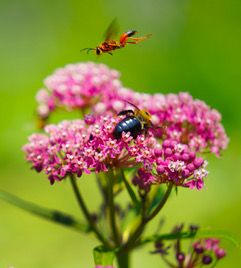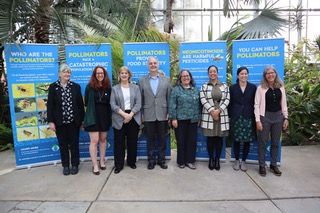A Threat to Pollinators is a Threat to Us All
The Case Against Harmful Neonicotinoid Insecticides Grows
as Pollinator Populations Decline

Rhode Island Environmental Groups Rally to Support Bills That Restrict Usage
of Neonicotinoid Insecticides (H7129 and S2299)
Smithfield, RI (May 12, 2022) – Environmental groups, legislators, and supporters gathered on Wednesday, May 11, 2022, at the Roger Williams Botanical Center in Providence for a legislative breakfast and speaking event to rally support of RI House Bill 7129 (Representative Kislak, D – District 4) and RI Senate Bill 2299 (Senator Miller, D – District 28) that would restrict the use of harmful neonicotinoid insecticides (neonics) in Rhode Island. These bills would take these dangerous chemicals out of the hands of untrained users. (Certified professionals could still use these chemicals when necessary.)
Audubon Society of Rhode Island, Conservation Law Foundation RI, The Nature Conservancy, and the Office of Sustainability for the City of Providence partnered to bring experts to speak of the dangers of neonics and why this legislation is so critical.

Event attendees from left: Meg Curran (Conservation Law Foundation), Sue AnderBois (The Nature Conservancy), Representative Mary Ann Shallcross Smith (D – District 46), Representative Arthur Handy (D – District 18), Representative Rebecca Kislak (D – District 4), Priscilla De La Cruz (Audubon Society of Rhode Island), Emily Koo (Office of Sustainability, City of Providence), Meg Kerr (Former Audubon Senior Director of Policy)
It is well documented that pollinators are facing a catastrophic decline in numbers. Over 40% of insect pollinators (bees, beetles, moths, butterflies) face the threat of extinction. These pollinators provide global food stability and support natural, healthy ecosystems in our communities.
Neonics affect the central nervous system of insects, resulting in paralysis and death. Studies show that neonic residues accumulate in pollen and nectar of treated plants and pose a risk to pollinators. These insecticides also contaminate waterways and are highly toxic to aquatic organisms. Neonics are found in hundreds of residential garden products, including insect sprays, seed treatments, soil drenches, and more. As a result of their pervasive use, there is concern that they play a role in the steep decline of pollinator populations.
Speaking at the event, Audubon Director of Avian Research Dr. Charles Clarkson brought focus to the danger of neonicotinoids on ecosystems and the impacts that scientists are seeing on other species as well as targeted insects. “Neonicotinoids have been implicated as a key factor in the decline of pollinating bee species, they are responsible for delayed migration in certain species of birds, and they are known to infiltrate aquatic habitats where their impacts are still unclear,” said Clarkson. “The evidence that these chemicals impact our ecosystems in adverse and potentially devastating ways is building.” This summer Audubon will begin monitoring birds from across the state for the presence of neonicotinoid insecticides to better understand how pervasive these chemicals are.
The City of Providence has been working to eliminate the use of pesticides in public parks and announced the Pesticide Free PVD Campaign on Earth Day 2021. “Providence is taking steps towards a chemical-free future, from leading by example in City parks to educating residents through the Pesticide Free PVD campaign,” explained speaker Emily Koo, Director of the Office of Sustainability for the City of Providence. “But this work can only go so far, and the City does not have the ability to restrict and limit exposure to harmful pesticides such as neonicotinoids. We urge members of the General Assembly to take action for the health of our communities and ecosystems.”
The environmental groups that sponsored this event have worked for several years on issues relating to pollinator health and habitat and are pleased to see progress and leadership at the statehouse. “Good legislation is a team sport. The work we’ve done on this bill this is a great example of how we need to work together to advocate and protect our environment,” said Representative Rebecca Kislak (D – District 4). “This year, with everyone’s hard work, we can protect our pollinators by making sure that only trained users handle dangerous pesticides like neonicotinoids.”
The event closed with a breakfast reception for legislators, advocates, and others in attendance. “We were so pleased that so many Rhode Islanders showed up to support programs and policies to protect our pollinators,” said Sue AnderBois, The Nature Conservancy Climate & Energy Manager. “The legislation sponsored by Representative Kislak and Senator Miller would go a long way toward protecting people and pollinators.”
How can Rhode Islanders help pollinators?
Simple choices can make a difference for these beneficial insects and the environment.
– Avoid using pesticides in your yard and garden.
– Plant native species for pollinators.
– Choose plants that are labeled organic or Neonic-free.
– Ask your local nursery to stop selling Neonic pesticides and treated plants.
– Buy organic fruits and vegetables when possible.
– Support Local Beekeepers.
– Speak out. Tell your legislators that you support regulation of Neonicotinoid Pesticides.
LEARN MORE:
– Watch a video of the May 11 speaking event, find more information about neonicotinoid insecticides, and learn how to contact your legislators at
– Find pollinator resources at
